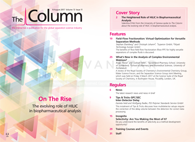Thermo and SRI International Announce Small Molecule Collaboration
Thermo Fisher Scientific Inc. and SRI International have announced they will be collaborating to enhance small molecule research.
Thermo Fisher Scientific Inc. (San Jose, California, USA) and SRI International (Menlo Park, California, USA) have announced they will be collaborating to enhance small molecule research.
The collaboration will allow researchers a direct link between Thermo’s Scientific Compound Discover 2.1 software platform and SRI international’s BioCyc, a collection of 9300 databases that provide electronic reference sources on the metabolic pathways and genomes of many organisms. This will enable automatic and interactive overlay of statistic data onto these pathways, and facilitate the biological interpretation of results obtained from a metabolomics experiment.
“Today, metabolomics researchers can measure thousands of small molecules, but it can be challenging to know which cellular systems are behaving differently in the studied condition compared to a control,” said Andreas Huhmer, director of proteomics and metabolomics marketing, chromatography and mass spectrometry at Thermo Fisher Scientific.
“The new integration will allow scientists using [the software platform] to automatically map the most detected compounds to BioCyc metabolic pathway diagrams, and to connect additional experimental data, such as relative abundance or differential expression, onto the pathways,” continued Huhmer.
Information from the collaboration was presented at the 13th Annual Conference of the Metabolomics Society on 25–29 June 2017 in Brisbane, Australia.
For more information please visit: www.thermofisher.com and www.sri.com

Regulatory Deadlines and Supply Chain Challenges Take Center Stage in Nitrosamine Discussion
April 10th 2025During an LCGC International peer exchange, Aloka Srinivasan, Mayank Bhanti, and Amber Burch discussed the regulatory deadlines and supply chain challenges that come with nitrosamine analysis.












